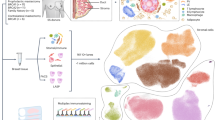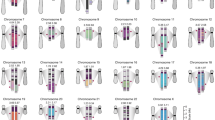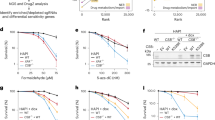Abstract
THERE is abundant experimental evidence that certain chromium compounds are carcinogenic in animals1,2. There are also epidemiological data which suggest that chromium compounds are carcinogenic in man2,4. Calcium chromate especially, produces epithelial lung tumours both by intrabronchial implantation1 and sarcomata by intramuscular administration to rats3. In epidemiological studies Bidstrup and Case4 reported a significantly high lung cancer mortality in men who worked in chromate-producing factories, and concluded that the most likely explanation of this increased risk was due to an occupational carcinogen.
This is a preview of subscription content, access via your institution
Access options
Subscribe to this journal
Receive 51 print issues and online access
$199.00 per year
only $3.90 per issue
Buy this article
- Purchase on Springer Link
- Instant access to full article PDF
Prices may be subject to local taxes which are calculated during checkout
Similar content being viewed by others
References
Laskin, S., Kuschner, M., and Drew, R. J., in Inhalation Carcinogenesis (edit. by Hanna, M. G., jun., Nettesheim, P., and Gilbert, J. R.), 327 (US Atomic Energy Commission, 1970).
IARC Monograph on the Evaluation of Carcinogenic Risk of Chemicals to man, 2, 120 (International Agency for Research on Cancer, Lyon, 1973).
Roe, F. J. C., and Carter, R. L., Br. J. Cancer, 23, 172–176 (1969).
Bidstrup, P. L., and Case, R. A. M., Br. J. industr. Med., 13, 260–264 (1956).
Miller, E. C., and Miller, J. A., in Chemical Mutagens: Principles and Methods for their Detection (edit. by Hollaender, A.), 1, 83–119 (Plenum Press, New York and London, 1971).
Ashwood-Smith, M. J., Trevino, J., and Ring, R., Nature, 240, 418–420 (1972).
Hueper, W. C., and Payne, W. W., Archs environ. Health, 5, 445–462 (1962).
Bridges, B. A., Dennis, R., and Munson, R. J., Genetics, 57, 897–908 (1967).
Tarmy, E. M., Venitt, S., and Brookes, P., Mutat. Res., 19, 153–166 (1973).
Phillips, J. H., and Brown, D. M., Progr. Nucleic Res., molec. Biol., 7, 349–368 (1967).
Mukai, R., Hawryluk, I., and Shapiro, R., Biochem. biophys. Res. Commun., 39, 983–988 (1970).
Bridges, B. A., Mottershead, R. P., Green, M. H. L., and Gray, W. J. H., Mutat. Res., 19, 295–303 (1973).
Witkin, E. M., Brookhaven Symp. Biol., 20, 17–55 (1967).
Kondo, S., Ichikawa, H., Iwo, K., and Kato, T., Genetics, 66, 187–217 (1970).
Sedgwick, S. G., and Bridges, B. A., Molec. gen. Genet., 119, 93–102 (1972).
Osborn, M., Person, S., Phillips, S., and Funk, F., J. molec. Biol., 26, 437–447 (1967).
Author information
Authors and Affiliations
Rights and permissions
About this article
Cite this article
VENITT, S., LEVY, L. Mutagenicity of chromates in bacteria and its relevance to chromate carcinogenesis. Nature 250, 493–495 (1974). https://doi.org/10.1038/250493a0
Received:
Revised:
Issue Date:
DOI: https://doi.org/10.1038/250493a0
This article is cited by
-
Mutagenic and carcinogenic actions of chromium and its compounds
Environmental Health and Preventive Medicine (2015)
-
The differential stress response of adapted chromite mine isolates Bacillus subtilis and Escherichia coli and its impact on bioremediation potential
Biodegradation (2013)
-
Performance Evaluation of Fixed Bed of Nano Calcium Oxide Synthesized from a Gastropod Shell (Achatina achatina) in Hexavalent Chromium Abstraction from Aqua System
Water, Air, & Soil Pollution (2012)
-
Experimental Investigation and Artificial Neural Network-Based Modeling of Batch Reduction of Hexavalent Chromium by Immobilized Cells of Newly Isolated Strain of Chromium-Resistant Bacteria
Water, Air, & Soil Pollution (2012)
-
Removal of Hexavalent Chromium-Contaminated Water and Wastewater: A Review
Water, Air, and Soil Pollution (2009)
Comments
By submitting a comment you agree to abide by our Terms and Community Guidelines. If you find something abusive or that does not comply with our terms or guidelines please flag it as inappropriate.



